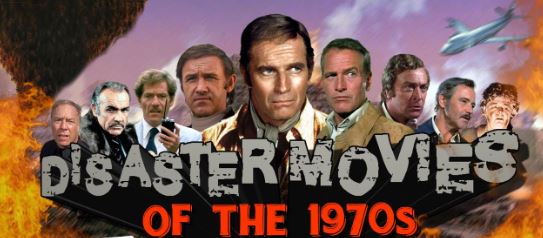
Movie: The Poseidon Adventure
Airport touched down in 1970, turning a $10million budget into a massive hit. It kicked off a decade-long cycle of star-studded disaster flicks that produced something of merit in The Towering Inferno before flaming out in a series of increasingly outlandish sniggerfests, such as pissed-off killer bees and exploding roller coasters. By its meek conclusion in 1980 (with the thoroughly unimpressive volcano-based antics of When Time Ran Out) the disaster flick was pretty much a byword for crap. Not that Hollywood is ever gonna accept the sub-genre exhausting itself in hammy excess and feeble special effects nearly half a century ago. No doubt it will continue to periodically raise its groggy, heavily bandaged head and trick people into handing over their hard-earned cash.
Still, the question remains: Why did people flock to the disaster flick in the seventies? Perhaps they were feeling nihilistic with all that racial conflict, Nam protests, student unrest, riots, assassinations, terrorist outrages, economic gloom, presidential naughtiness, serial killer proliferation and ongoing superpower mistrust. Who knows? Or maybe they had a healthy yen for the often-absurd characters, such as a floppy-haired Martin Sheen playing the mountain-climbing, heroin-smuggling fuck toy of a sarcastic cougar in 1976’s The Cassandra Crossing. Personally, my money’s on the fact we’ve always hated each other, leaving us happy to secretly revel in thousands of our kind being obliterated on the silver screen.
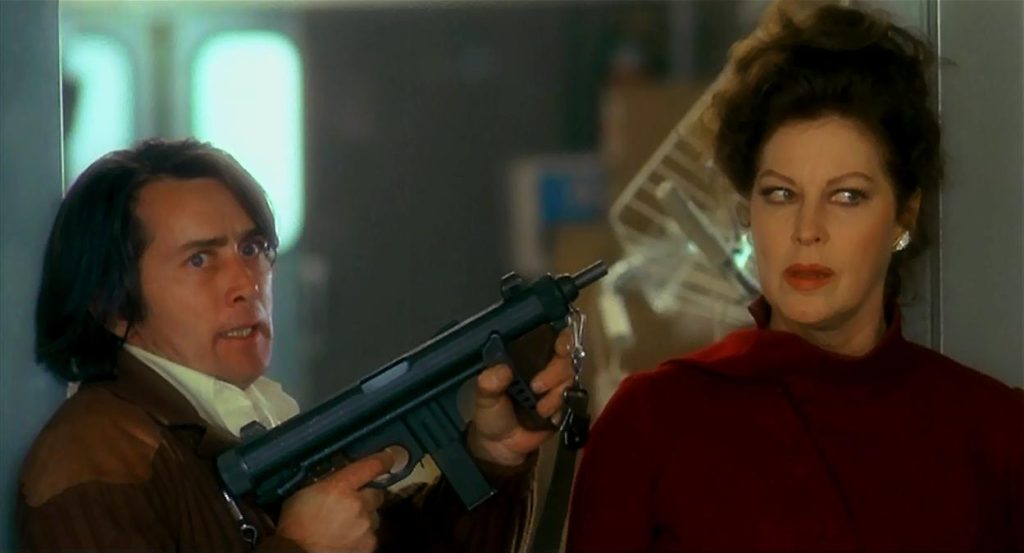
However, I’m more baffled by how a god-awful suicide bomber flick like Airport kicked off such a craze. Man, it’s a turkey. Made at the start of cinema’s greatest decade, it’s so tame and awash with groan-worthy dialogue it feels like it’s been vomited up from the fifties. After one hundred minutes of tedious soapy nonsense and lame attempts at light comedy I couldn’t help thinking excuse me, but where the fuck is the disaster? You try getting interested in an annoying little old lady stowaway, a bespectacled teenage nerd talking about constellations, and tanned pilot Dean Martin going pro-life after knocking up a hot stewardess almost thirty years younger.
It’s so bad that disaster flick regular George Kennedy even explains at length why an onboard explosion would be bad news. Finally, our villain gets his moment in the spotlight but is so inept he only manages to blow a two-foot square hole in the fuselage. Did he just let off a bomb or a firecracker? But don’t worry, folks, because a Catholic priest has just been ‘put in charge of praying’. Bloody hell, what sort of disaster movie is this? Only one person carks it and he was a sweaty loser that planned to die.
Terrible. Truly terrible. One hundred and thirty-five minutes of shite that somehow garnered nine Oscar nods.
There is an upside to the pseudo-disaster flick Airport, though. Things could only get better.
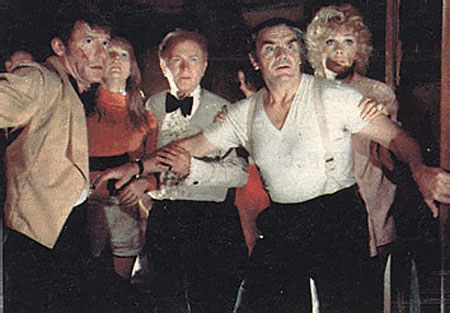
“This isn’t some toy boat in a bathtub.” The Poseidon Adventure (1972)
Preamble: Promising Hell, Upside Down, this catastrophe outing replicated Airport’s success by becoming 1973’s biggest box office hit and earning eight Oscar nods. More importantly, it’s a better watch. A not exactly shipshape ocean liner is on its way to Europe on New Year’s Eve when it loses a tussle with a quake-generated tidal wave. Much topsy-turvy shit ensues.
Is a doomsayer ignored? Well, the ship’s captain (Leslie Nielsen) knows they need to take on extra ballast, but the SS Poseidon’s dastardly new owners prefer speed over safety. “I can’t afford to gamble with the lives of my passengers!” Nielsen cries. “Running an unstable ship at full ahead is dangerous, especially one as old as this!” However, threatened with demotion, he meekly caves in, gaining glorious revenge eight years later by spoofing such po-faced malarkey in Airplane!
How do the special effects hold up? Poseidon doesn’t make Airport’s glaring mistake of taking a fucking age to get down to the nitty-gritty. Less than half an hour in and the lookout is talking of an ‘enormous wall of water’ traveling at high speed toward the ship. Oh, goody. Unfortunately, the moment of collision is dealt with far too hastily. To be honest, it’s almost skipped over, comparing badly to something like Cameron’s Titanic. Otherwise, it’s all acceptable. I quite liked the sight of the passengers hanging off bolted-down tables on the newly oriented ceiling and then dropping one by one. Sort of surreal, you know?
Most ridiculous character/relationship: For some reason we get an ex-hooker scared of bumping into her former johns on a cruise ship. I don’t think this is very likely. I mean, I’ve banged a few hookers and never once taken a cruise afterward. Still, disaster movies often like to chuck in such colorful, outlandish types. Look at Shelley Winters. What did she use to be? The underwater swimming champ of New York three years running. At least she gets to employ her former talents whereas the ex-hooker doesn’t once fuck anyone for money.
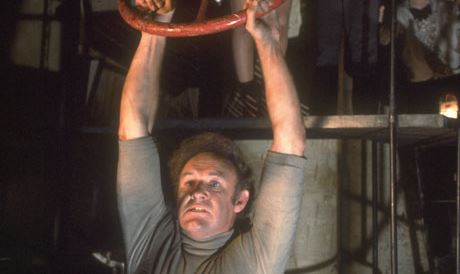
Elsewhere, Gene Hackman is a renegade preacher getting shunted off to Africa to do a spot of unplanned missionary work. I’m not sure how such a profession prepares him for being an ace survivalist or to know about technical things like a propeller shaft, but his ability to find his way through a flooded, overturned ship borders on the psychic. His awkward climactic rant against God is also mildly embarrassing. “We did ask you to fight for us,” he shouts with a raised fist after another sucker bites the dust, “but damn it, don’t fight against us!”
Worst line: After being told her brother (and fellow member of the ship’s band) is dead, dippy folk singer Carol Lynley asks: “Did you like his music?”
Does a child die? The 70s disaster flick teaches us that a child’s life is sacrosanct. Children must be rescued at all costs. Adults, on the other hand, are ten-a-penny sorts and eminently disposable. Just take a peek at The Cassandra Crossing‘s red-haired little angel who survives pneumonic plague and bullets flying all around her to eventually offer the camera a close-up of her shocked, teary, but undefeated and ever so sweet face. In Poseidon we have to endure a freckle-faced, unbearably precocious brat named Robin who likes to use the bed as a trampoline, rag his teenage sister, learn about the ship’s technical capabilities and hang out with the captain. Apparently, the only child onboard, you know from the moment you meet him there’s not a chance in hell of seeing his corpse.
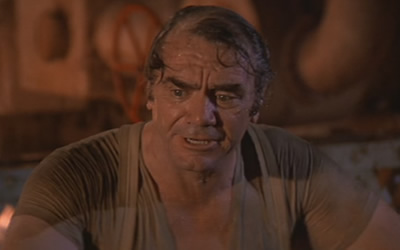
Is George Kennedy, Ernest Borgnine or Charlton Heston in it? Kennedy, Borgnine and Heston were Oscar-winning tough guy actors. I’ve time for all three, especially as they enriched stuff like Bad Day at Black Rock, Dirty Dozen, Cool Hand Luke, Planet of the Apes and Wild Bunch. After making such a valuable contribution, they then got together and apparently decided to milk the hell out of the disaster fad while laughing all the way to the bank. Kennedy alone committed the heinous crime of starring in all four Airport-related flicks.
In Poseidon Borgnine is a cop in a constant strop, objecting to anything and everything, including suppositories, bad language and his sassy wife’s lack of a bra. Mostly, however, he butts heads with de facto leader and fellow alpha male, Hackman. It’s a fairly exhausting performance. Wins points, though, for clearly wanting to drown that irritating, know-it-all brat Robin.
Funniest death: An obese, soggy Winters. See below.
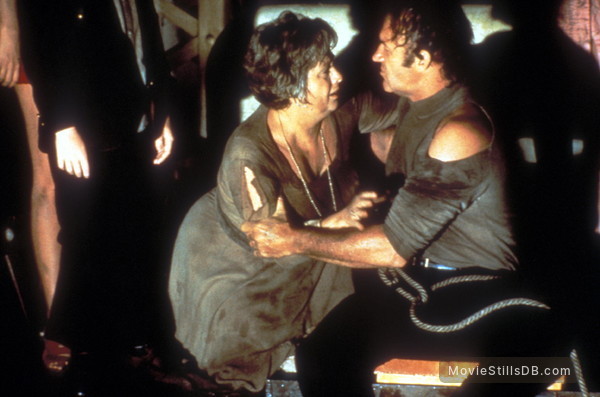
Who shits their pants or goes mad? Not Poseidon’s strong point, we only get one scene of mass panic involving an unsuccessful scramble up a giant Christmas tree.
The inevitable self-sacrifice: There’s a couple, but I’ll focus on Winters. She shows immense bravery in rescuing Hackman when he gets trapped underwater. “In the water I’m a very skinny lady,” she tells him once they’re both safe. Her reward? An immediate fatal heart attack.
What does the token black do? In 1974’s The Towering Inferno security guard O.J. Simpson rescued a cat. This should give you some idea that minorities don’t get a lot to do in 70s disaster flicks. Catastrophe, you see, is whitey’s concern. Poseidon is the perfect example in that I only spotted a solitary Indian passenger. She gets to sit next to Hackman, smile, raise a glass of champagne and look bizarrely out of place, even though she’s on a cruise ship traveling all over the world. And no, she doesn’t even come close to rescuing a cat.
Conclusion: Poseidon is reasonably inventive. As the passengers climb up through the decks, there’s some suspense in trying to guess who’s gonna die, especially when the ship gets rocked by periodic explosions and bouts of flooding. Its underwater engine room sequence is good. Indeed, it’s tricky to mock Poseidon too much because apart from the often-clunky dialogue and the weirdly insistent civility, it’s competently put together.